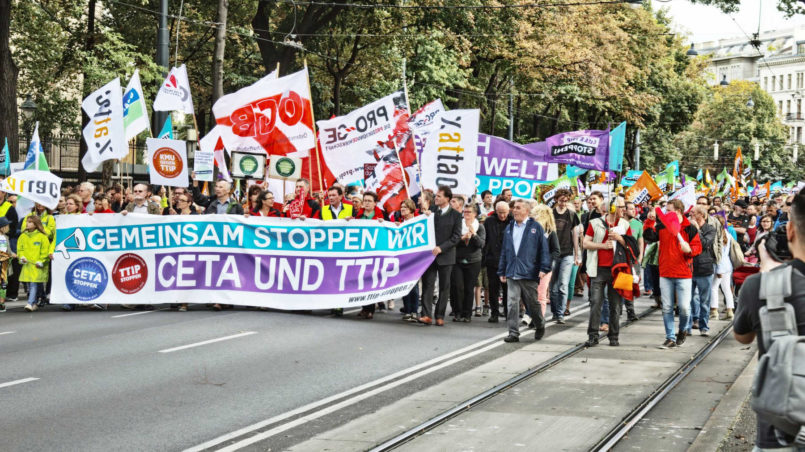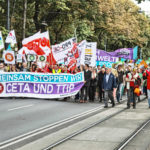On Globalisation, Free Trade and Design Alternatives

Event data
- Datum
- 6. 6. 2017
- Host
- C3 - Centrum für Internationale Entwicklung, Vienna
- Location
- C3 - Centrum für Internationale Entwicklung, Sensengasse 3, 1090 Wien
- Event-type
- Vortrag
- Participants
- Karin Fischer, Abteilungsleiterin für Politik und Entwicklungsforschung an der Johannes-Kepler-Universität
- Werner Raza, Leiter der Österreichischen Forschungsstiftung für Internationale Entwicklung
- Alexandra Strickner, Mitbegründerin von Attac
- Dennis Tamesberger, Referent für Arbeitsmarktpolitik für die Arbeiterkammer Oberösterreich
On Monday, June 6, I attended a lecture in the ‘C3 – Centrum für Internationale Entwicklung‘ (C3 – Centre for International Development) on alternative design possibilities of globalization. The podium speakers were: Karin Fischer, Department Head for policy and development research at the Johannes Kepler University; Werner Raza, Head of the Austrian Research Foundation for International Development; Alexandra Strickner, co-founder of Attac, and Dennis Tamesberger, labour market expert at the Department of Economic, Welfare and Social Policy of the Chamber of Labour, Upper Austria. Oliver Prausmüller, Member of the Advisory Council for Economic, Social and Environmental Affairs, led the discussion.
Prausmüller immediately started with a statement regarding the political landscape in Europe. According to him, the existing old parties are no alternatives to the current views of neoliberalism and the populism. The question is: what rules are necessary for humane globalisation? He then gave the floor to Fischer, who started to talk about the background and emergence of movements critical of globalisation.
At this point, Raza took over with the question of the role of economic knowledge in the issue of globalisation. In the last 15 years, in the discussions regarding trade policy, a community of scientists from official institutions such as the World Trade Organisation and the EU has been formed, which dominate the debate. This community extends from universities, the contract research for the EU to policy guidance and also has common ground, such as the support of the abolition of customs duties and a supranational framework in trade policy.
These are the subject of discussion because apparently these things are trade barriers which should be removed.
The expansion of this trade concept of globalisation goes back to the ’80s and was then also picked up within the United Nations, which led to the establishment of the World Trade Organisation (WTO). This transposition of trade policy topics also changed the manner in which the debate and the direction of these issues were dealt with. For example in order to reduce the so-called trade barriers. The reduction of environmental protection, for example, promotes trade as, because of this, trade costs sink.
There has been a change of context: topics which, in the past, were dealt with under different aspects, are now unified. The earlier agreement proposals of the WTO were multilateral, that means they affected several states in order to prevent countries from being able to revoke trade concessions. At that time, this one-dimensionality therefore was already firmly anchored and this is why many international organisations such as the EU or the OECD still insist on it. According to them, policy has to consistently further develop towards more free trade and less regulation.
Many liberal economists agreed with this opinion after the financial crisis in 2008, and the EU and OECD have now published papers in which those disadvantages are admitted. Economic growth does exist, but cannot be found/rediscovered in higher investments, a positive connection between trade and growth is disputed.
The political answer is that open markets nevertheless have more advantages, such as a greater choice of products and more efficiency in production. Promises, such as more increased investment in education, have been broken and allianced with trade unions and other democratic institutions have been formed in order to prevent right-winged populism. The second argument is that it is too expensive to run economic stimulus programmes and that free trade agreements are a cheaper solution for more economic power. As such, democratic functionaries in Austria and Germany, for example, supported CETA. However, exports would only work as long as only small companies export. But if large economic blocs export, then the export demand will cover much more than what is good for all countries. The excursus of Raza ended here.
The moderator continued with the issue of what one could introduce regarding civil economic solutions. Now Tamesberger continued.
For the answer, he went back to the year 1789.
In his essay for proposals, what impedes the ideal objective of enlightenment is discussed. Thus, morale could fall due to, for example, more competition: in a competitive situation, companies with the lowest moral obligations have advantages. He therefore recommends a European supervisory agency for trade goods and gives the Japanese Topama programme, which concentrates on ecological aspects such as energy efficiency, as a role model. Here the most energy-efficient product or company is the standard for all the others on the market and, within a certain amount of time, all of the other companies have to follow in order to reach this standard.
Here he finished and the moderator invited Strickner to begin with a question regarding the strategy of movements critical of globalisation. She said that, due to wider campaigns against TTIP and CETA, almost the whole spectrum of trade unions, which had previously rather been on the side of the World Trade Organisation, was won. It is also new that many farmers are involved. However, also middle-sized companies in western Europe have joined in the critique which would never have happened 15 years ago.
She then addressed the question of why those progressive ideas have not been accepted. A reason was the lack of political figures: the social democratic parties had the chance to take this up but still rather oriented themselves towards the mainstream. With the election of Trump, the criticism of globalisation has become more connected to right-winged populistic views. But a fundamentally different organisation of the economy is much more the objective. This reorganisation could only happen if everyone thinks.
Here she finished and the moderator thanked the audience for coming.
Translation into English: Anna Stockenhuber
Credits
| Image | Title | Author | License |
|---|---|---|---|
 |
Demo gegen TTIP & CETA in Wien | Thomas Fellinger | CC BY-SA 4.0 |
